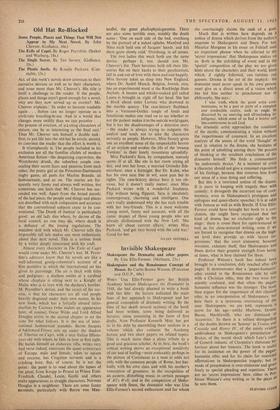Invisible Shakespeare
Shakespeare the Dramatist and other papers. By Una Ellis-Fermor. (Methuen, 25s.)
WHEN Una Ellis-Fermor gave her British Academy lecture Shakespeare the Dramatist in 1948, she had already planned to write a book with this title : the lecture indicated the main lines of her approach to Shakespeare and her general conception of dramatic writing. By the time of her death several sections of the book had been written, some being delivered as lectures, some remaining in the form of first drafts. Now Professor Kenneth Muir has put us in his debt by assembling these sections in a volume which also contains the Academy lecture and two short papers on related topics. This is much more than a pious tribute to a good and gracious scholar. At its best, the book's critical writing shows an exceptional sensitivity of ear and of feeling—most noticeably perhaps in the picture of Coriolanus as a man at odds not only with the common people of Rome, but bas- ically with his own class and with his mother's conception of greatness; in the recognition of an austere, disturbing music in certain passages of All's Well; and in the comparison of Shake- speare with Ibsen, the dramatist who was Una Ellis-Fermor's second enthusiasm and for whom
she convincingly claims the rank of a poet.
Much that is written here depends on a notion of drama which derives from the author's response to Shakespeare and Ibsen. For her, Maurice Morgann in his essay on Falstaff used an important phrase when he referred to the `secret impressions' that Shakespeare makes on us Both in the unfolding of event and in the `spatial' composition of the play we are given hints about the characters and their world, hints which, if rightly followed, can validate our guesses. Drama is the art of the implicit : the dramatist must never speak in his own person, must give us a direct sense of a vision which has led him neither to preachment nor to philosophy. She says : 1 take truth, which the great artist corn' municates, to be a part or parts of a complete and irreducible reality, such as might be discerned by an unerring and all-including in- telligence, which some of us find it briefer and less cumbersome to call God.
The dramatic artist approaches the condition of the mystic, communicating a vision without the impertinence of comment. In an excellent analysis of the senses of the word 'thought' as used in relation to the drama, she hesitates at the point of admitting among them `the process of thinking 'or the resultant conclusions of the dramatist himself.' She finds a commentator 'an undramatic device.' At a moment of crisis a character should not give a reasoned exposition of his feelings, because that removes him from our sense of a man doing and suffering.
But this is a restricted notion of the drama. It is more in keeping with tragedy than with comedy; it disregards the recurrent use of com- mentary, even in Shakespeare's prologues and epilogues and quasi-choric speeches; it is at odds with Jonson as well as with Brecht. If Una Ellis- Fermor could have brought her book to a con- clusion, she might have recognised that her kind of drama has no exclusive right to the stage : there is room there for open-textured as well as for close-textured writing, even if we are forced to recognise that drama on the high' est level does provide us with 'secret im- pressions,' that the overt statement, however resonant, exhausts itself, that Shakespeare and Ibsen derive their greatest strength from being' at times, what is here claimed for them.
Professor Watson's book has indeed been brought to a conclusion, duly reached after 450 pages. It demonstrates that a 'pagan-humanist' ethic existed in the Renaissance side by side with a Christian ethic, that the two were fre' quently confused, and that often the pagan' humanist influence was the stronger. The book then argues for the importance of this classical ethic in an interpretation of Shakespeare, bill here there is a strenuous overstating of the case. Shakespeare, we are told, represents 3 norm for his age—unlike Marlowe, Donne, Bacon, Machiavelli, who are dismissed as `eccentrics.' So there is a valiant disregarding, of the doubts thrown on 'honour' in Troilus and Cressida and Henry IV, of the surely evident ambivalence in Shakespeare's presentation of Brutus, of the moral shock which Lear's curse of Goneril induces, of Cleopatra's elaborate be haviour about her treasure. The book is useful for its insistence, on the power of the pagan; humanist ethic and for its claim for restricted affirmations in Shakespearian tragedy; but 45 mode of presentation is over-elaborate and given freely to special pleading and repetition. There are no 'secret impressions' here, either in Pro- fessor' Watson's own writing or in the plays as he sees them.
CLIFFORD LEECH






























 Previous page
Previous page